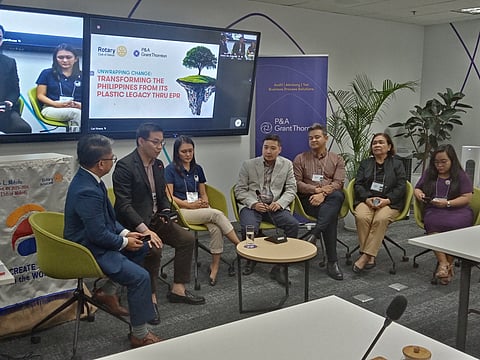
- NEWS
- the EDIT
- COMMENTARY
- BUSINESS
- LIFE
- SHOW
- ACTION
- GLOBAL GOALS
- SNAPS
- DYARYO TIRADA
- MORE

The country’s nascent circular economy is driven by a network of leaders and organizations committed to solving the plastic waste crisis. Some of the faces of this circularity circle were recently brought together by the Rotary Club of Makati and the P&A Grant Thornton to report on the progress of the implementation of the Extended Producers Responsibility (EPR) Act of 2022, one of the foundations of the Philippine circular economy.
The forum entitled “Unwrapping change: Transforming the Philippines from its Plastic Legacy thru EPR” was attended by Rina Neoh, secretary general of the ESG Association of Malaysia as the keynote speaker, with Department of Environment and Natural Resources (DENR) Secretary Maria Antonia Yulo-Loyzaga as resource speaker represented by DENR Undersecretary for Policy, Planning and International Affairs Atty. Jonas R. Leones.
The panelists consisted of Commissioner Crispin Lao, vice chairman of the National Solid Waste Management Commission under the Office of the President and private sector representative for recycling industry; Elvin Ivan Uy, executive director of the Philippine Business for Social Progress; Erica Cardoso, managing director of Evergreen Labs Philippines; Stanley Siahetiong, Energy Transition manager of Shell Pilipinas Corp.; Rudi Ramin, commercial director of Plastic Credit Exchange; Engr. Esperanza A. Sajul, assistant director of Environmental Management Bureau under the DENR.
More than 200 other stakeholders joined the discussion online, including Lao.
Leones, who was also online, delivered Yulo-Loyzaga’s report on the progress of the EPR law implementation in the forum. According to the secretary, the DENR already established the circular economy knowledge portal, data platform and EPR registry.
The EPR law requires companies to submit their EPR programs. A total 917 firms did so, including 129 so-called obliged enterprises (OEs) which are big consumers and producers of plastic products. Nearly 300 micro, small and medium enterprises also submitted EPR programs.
DENR also issued Administrative Order No. 2024-04 to guide EPR-covered companies in making their compliance report and having their plastic waste programs audited.
Yulo-Loyzaga admitted that there are still a lot of work to do.
“From 2023 to 2028, we are aiming to improve waste collection, segregation and disposal, and reduce the amount of plastics that enter the natural ecosystems especially the ocean by upgrading waste management infrastructure and carrying out stricter regulation,” she said.
The secretary added that the circularity circle should have more investments in recycling technologies, training programs and incentives by 2034 to encourage more significant participation from the community, as well as bolster public education campaigns and legislations to restrict single-use plastics and promote its alternatives by 2040.
Further, the Philippines should avail of a plastic waste reduction bond similar to the $100-million fundraiser launched by the Plastic Collective, World Bank and Citi Bank for Ghana and Indonesia in January. Such bond will help fund the expansion of recycling capacities; enhancement of waste collector livelihoods and welfare in the circular value chain through just compensation, social protection and occupational safety, healthcare and medical insurance; assistance to OEs in meeting their EPR requirements and net zero commitment; and the sustainable removal of plastic from nature.
“Our plastic problem stems from our societal situation and requires a significant change in social and behavioral norms. Our current action will determine the legacy we leave behind. But this can only be achieved with the collaboration of all stakeholders present. Let’s work together to chart a course towards a future, where sustainability, responsibility and innovation influence our decisions and our dedication to the environment defines our legacy,” Yulo-Loyzaga said.
